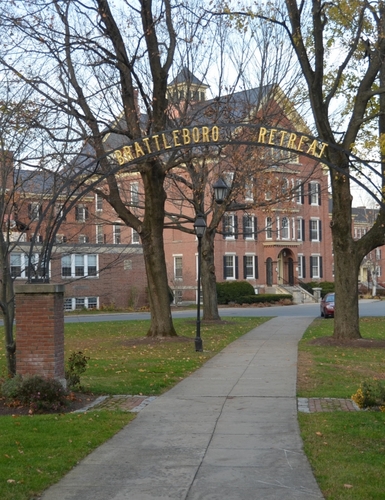ROCKINGHAM — The Brattleboro Retreat is in a bad way.
News articles about a possible closure and highly critical letters published by patients' relatives and employees depict a troubled organization. Threats to turn away patients or limit services, coupled with a demand for $2 million more from taxpayers to keep the doors open, reveal fundamental problems at an institution we entrust to care for some of Vermont's most vulnerable citizens.
If an organization perennially outspends its budget, delivers subpar services, and alienates many of its employees, attention inevitably turns to its management.
Though almost every other aspect of the institution's operations has been discussed here in The Commons and elsewhere, the salaries that the administration pays itself haven't been publicized.
* * *
The Retreat's IRS Form 990 provides a fascinating window into its budgetary priorities. Basically, the form - which tax-exempt nonprofits file annually in lieu of taxes - documents how they get and spend their money and who is involved.
Among the most interesting parts of these publicly accessible forms is Part VII, where the nonprofit must identify the most highly paid employees and list their salaries and other compensation.
As of 2017, here are those employees' names, titles, and total compensation:
• Dr. Louis Josephson, CEO: $447,397
• Steven Monette, past CFO: $224,690
• Arthur Nichols, CFO: $106,861 (partial year?)
• Lisa Lambert, psychiatrist: $422,249
• Mark McGee, chief medical officer: $336,494
• Frederick Engstrom, psychiatrist: $321,792
• Dorothea Degutis, psychiatrist: $289,251
• John Fanton, psychiatrist: $269,681
These numbers are out of date, because the most recent 990 available easily for the Retreat is three years old. Certainly, those salaries are at least 6 percent higher now, given cost-of-living adjustment raises.
Notable in the 2016 Form 990 is that in addition to Dr. Josephson's full-year salary, the board paid $150,293 to departing CEO Robert Simpson, who stepped down on Dec. 31, 2015. Unpublicized at the time, this goodbye present - perhaps consulting fees? - included $52,833 in “bonus and incentive compensation.” It was a nice gesture, but perhaps not the best use of scarce funds.
Although the Retreat's fund-raisers work hard and our communities respond with generosity, total gifts and fund-raising event revenues of $443,348 didn't even cover the CEO and CFO's salaries in 2017. Injecting another $2 million of taxpayer money seems to be the Band-Aid of choice. Sadly, every penny of that money and more will be needed to pay just the salaries of the eight most highly compensated employees.
Though Vermont's resources and cost of living are vastly lower than urban areas and our institutions much smaller, the paychecks of most of our nonprofit health CEOs rival those of their urban counterparts.
The traditional argument for hospitals paying these eye-popping salaries is that “we must attract the most capable people.” The Retreat's discouraging performance in the past few years undercuts that reasoning.
* * *
Over the years, nonprofit CEOs accumulate substantial influence on who becomes and remains a board member. Critical voices are often muffled or quietly shuffled off the board.
If the Retreat were a private company, it could pretty much do whatever the management decides is in the shareholders' interest. But as a nonprofit entity - supported largely by government and donors - the Retreat board has a responsibility to justify these salaries to us in terms of performance.
Would patient capacity and outcomes improve if administrative salary growth were restrained, allowing more money to be invested directly in improving facilities and front-line care?
I'm not accusing the Retreat board of malfeasance. They are hardworking volunteers who donate their time and expertise. But since the buck stops with them and most of the bucks are from taxpayers with no say in how the place is run, it's time for the state of Vermont and those individuals and companies who contribute to the Retreat to ask a few questions of the board.
My first one would be, “Where is the proof that our substantial investment in managerial salaries is yielding the results we would expect from such highly paid administrators?”
